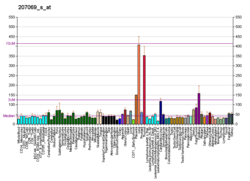A request that this article title be changed to SMAD6 is under discussion . Please do not move this article until the discussion is closed. |
SMAD family member 6, also known as SMAD6, is a protein that in humans is encoded by the SMAD6 gene. [5]
Contents
SMAD6 is a protein that, as its name describes, is a homolog of the Drosophila gene "mothers against decapentaplegic". It belongs to the SMAD family of proteins, which belong to the TGFβ superfamily of modulators. Like many other TGFβ family members SMAD6 is involved in cell signalling. It acts as a regulator of TGFβ family (such as bone morphogenetic proteins) activity by competing with SMAD4 and preventing the transcription of SMAD4's gene products. There are two known isoforms of this protein.





